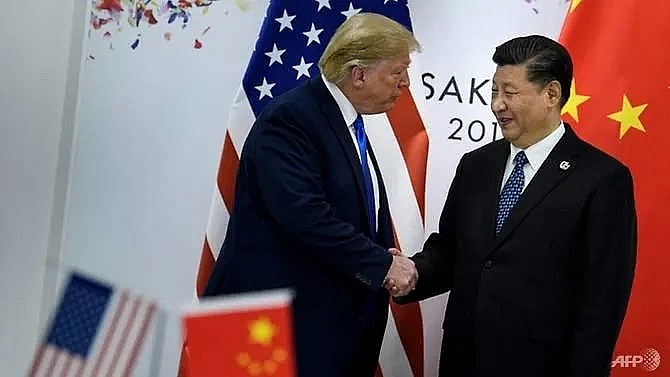US-China trade talks resume but major hurdles remain
 |
| China's President Xi Jinping (right) greets US President Donald Trump before a bilateral meeting on the sidelines of the G20 Summit in Osaka on Jun 29, 2019. (AFP/Brendan Smialowski) |
Striking a bargain with China is "extremely - I wouldn't even say complicated but very intricate," US President Donald Trump said on Saturday on the sidelines of the Group of 20 summit in Japan, where he announced the resumption of talks.
TARIFFS
Beijing wants the hundreds of billions of dollars in US tariffs imposed last year to be lifted. But the Trump administration has insisted on maintaining this as leverage, at least partly, to help make any final deal stick.
To get talks started again, Trump said in Japan he would not impose any new tariffs on Chinese imports - "at least not for the time being" - but would not lift any either.
Currently, Washington has slapped tariffs on US$250 billion in Chinese exports, a little less than half of everything that Americans buy from China each year. China, which buys less, has responded with retaliatory duties on US$110 billion in US exports.
HUAWEI
The race for dominance in high technology is perhaps the thorniest matter in the two sides' dispute and shows the high stakes they are playing for.
US officials believe China exploits the telecommunications equipment produced by China's Huawei, the world's second-largest maker of smartphones, for espionage, something the company rejects.
In May, Trump blacklisted Huawei, barring US companies from selling it badly needed components. But over the weekend, the president signaled a softer position, saying companies would be allowed to resume those exports "where there's no great national security problem."
So far the administration has not specified which exports would be permissible. And Trump said resolving the matter conclusively would be a question for the end of the trade talks.
POLITICAL OBSTACLES
Multiple US lawmakers, including Republican Senator Marco Rubio of Florida, are opposed to any loosening of restrictions.
In China, Xi Jinping must contend with senior Communist Party figures and the leaders of state enterprises who accuse Washington of an attempt to destroy China's economic model, which has seen it grow into the world's second-largest economy.
STRUCTURAL CHANGES
Washington is demanding that Beijing end massive state intervention in markets and the forced transfer of American companies' technological know-how.
In May, Trump accused Chinese negotiators of backsliding on commitments they had already made during trade talks, resulting in a breakdown in negotiations and a steep increase in duties on Chinese imports.
Trump reiterated on Saturday that he wanted "to get the deal right" and was in no hurry to accept a substandard bargain. But Beijing has not said it is ready to change the trade practices at the heart of the impasse.
AGRICULTURE
In return for suspending new tariffs, Washington says it won a commitment from China to buy more US farm exports.
The farm sector, which Trump has celebrated, has been hardest hit by the trade war. Soy exports to China, a market on which US farmers had come to depend heavily, fell 75 per cent last year to just US$3.1 billion.
Trump has announced taxpayer bailouts for farmers (US$12 billion last year, with another US$16 billion announced in May). But discontent is growing, just as Trump gears up to seek reelection next year.
"China is going to be buying a tremendous amount of food and agricultural product," Trump said, adding the American farm sector would be "a tremendous beneficiary."
"We're going to give them lists of things that we'd like them to buy."
INVESTMENTS
As a gesture of good will, China announced on Sunday that effective immediately it would soften some restrictions on foreign investment in sectors such as maritime transportation and some telecommunications services as well as oil and gas exploration.
What the stars mean:
★ Poor ★ ★ Promising ★★★ Good ★★★★ Very good ★★★★★ Exceptional
Related Contents
Latest News
More News
- Russian President congratulates Vietnamese Party leader during phone talks (January 25, 2026 | 09:58)
- Worldwide congratulations underscore confidence in Vietnam’s 14th Party Congress (January 23, 2026 | 09:02)
- Political parties, organisations, int’l friends send congratulations to 14th National Party Congress (January 22, 2026 | 09:33)
- 14th National Party Congress: Japanese media highlight Vietnam’s growth targets (January 21, 2026 | 09:46)
- 14th National Party Congress: Driving force for Vietnam to continue renewal, innovation, breakthroughs (January 21, 2026 | 09:42)
- Vietnam remains spiritual support for progressive forces: Colombian party leader (January 21, 2026 | 08:00)
- Int'l media provides large coverage of 14th National Party Congress's first working day (January 20, 2026 | 09:09)
- Vietnamese firms win top honours at ASEAN Digital Awards (January 16, 2026 | 16:45)
- ASEAN Digital Ministers' Meeting opens in Hanoi (January 15, 2026 | 15:33)
- ASEAN economies move up the global chip value chain (December 09, 2025 | 13:32)

 Tag:
Tag:




















 Mobile Version
Mobile Version